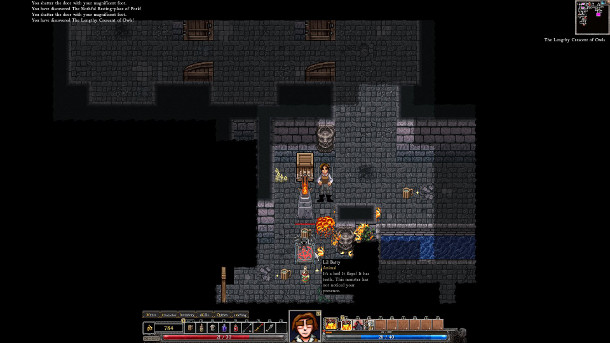This is the story of a genre. It started, as they all do, with just one game: Rogue, a procedurally generated dungeon crawler. Rogue proved to be so popular that it inspired an entire generation of game designers to emulate it, leading to a wave of games that are collectively referred to as "roguelikes." The rules of the genre have been fairly solid for the past three decades, but a recent wave of roguelikes has been united in one key factor: they've all proved willing to subvert the standards that their predecessors have established. Are these new games the vanguard of a new revolution in the roguelike genre?

Before we can answer that question, it's worth examining what the actual rules are that these new games break. Unlike the unwritten codes that govern other genres, the roguelike is unique in that it actually has a set of established commandments. In 2008, the first International Roguelike Conference met in Berlin, where a group of developers laid down the rules tor any game that wanted to claim the legacy of Rogue. All roguelikes, they decreed, must:
- Be turn-based.
- Have randomly-generated environments.
- Include permanent failure and death.
- Have a single, unified command set (no different menus).
- Not follow a linear path.
- Force you to discover the nature of any items you find.
There were other aspects, of course, such as how ASCII graphics were heavily encouraged, but the rules above were the bare minimum. The authors called it the Berlin Interpretation, a term that sounds more like quantum physics than game design. The rules were so strict that even classic roguelikes like Angbad found that their shopping menus disqualified them. What the drafters didn't realise was that their little genre was about to open up in a big way.

Spelunky's ideas seemed obvious in retrospect, but it would go on to inspire five years of innovation in the roguelike genre. "Spelunky showed us that you can distill some of the intensity found in roguelikes and combine it with other genres," say Justin Ma and Matthew Davis, creators of indie spaceship adventure FTL. They weren't the only ones. Soon other developers began producing roguelike or roguelike-inspired games (Yu calls them roguelike-likes) that targeted not just hardcore fans, but the wider gaming market.

Accessibility was the key, as David Baumgart, Art Director on Dungeons of Dredmor says: "Traditional roguelikes are intrinsically unfriendly to new players, and anyone who learned to use a computer on a machine with a GUI for that matter." Dredmor is known for its cartoon graphics and jokey, accessible style: it started with Nicholas Vining's simple goal of creating a version of Nethack his father could play. As his colleague Daniel Jacobsen says: "At first we were attempting to make a roguelike that could be played with just a mouse... we realized that the goal was really just a reframing of the desire to make a roguelike for gamers who hadn't played a roguelike before."

But which of these games is the real roguelike? The familiar dungeon crawler in ASCII graphics, or the new breed of indie games experimenting with the concept? Ma and Davis aren't sure. "We never set out to make FTL a true 'roguelike,'" they say. Instead, they see themselves as taking inspiration from the roguelike genre without fully being part of it. Like a shooter with RPG elements, FTL uses permadeath and heavy randomization while eschewing the traditional dungeon crawl. Those elements, they argue, create a challenging, unpredictable game that forces you to constantly make difficult decisions. That's the core of what makes roguelikes fun, whatever you call the genre.
This is what a genre is: not a strict rulebook, but an idea, one that can be combined with any other genre to create something new and experimental. And once an idea gets rolling, it can't be stopped. Joubert is so excited by the possibilities he even began brainstorming a mystery-solving roguelike in the middle of our interview, while Ma pointed to XCOM's Iron Man mode as evidence that mainstream developers are already latching onto the idea.
That's the thing about genres: once they get released into the wild, no one can know how they're going to evolve. If there's any sure thing about roguelikes, it's that the past few years have been tremendously exciting for fans of the genre. Here's hoping that equally innovative games are in store for us in the near future.
RPG character-progression systems have influenced games in many other genres over the past decade. Which genres could use an injection of roguelike innovation? Could Joubert's dream of a procedurally generated mystery come true?




